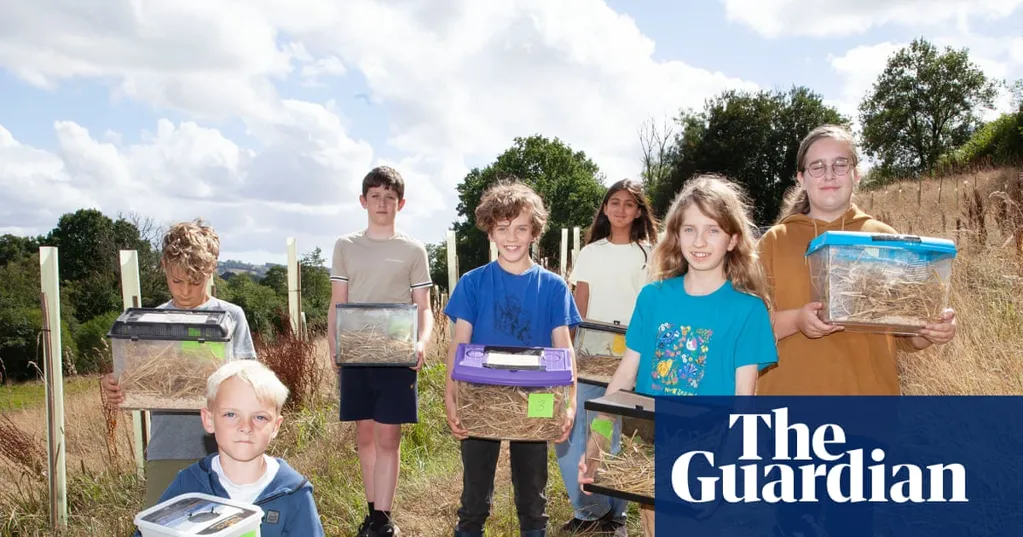Spurred into action by the species' threatened future, two best friends embarked on a project to release 250 of the animals in Devon.
Doing somersaults in the corner of a field in Devon this week were the fluffy results of an audacious wildlife project by two 13-year-old girls.
Best friends Eva Wishart and Emily Smith had become devoted to harvest mice and were upset, a couple of years ago, to find out the species is threatened in England due to farming practices and habitat loss.
The two girls took matters into their own hands and decided to replenish local harvest mice stocks themselves. In the two years since, they have bred dozens of the tiny rodents in their garages and on Wednesday they released 250 of them into a nature reserve near Wishart's home.
Harvest mice are Britain's smallest rodent, at just 70 millimetres long, with sandy fur that helps them to blend into the grasses in which they nest. The mice are an important prey species for larger animals and a major predator of insects that can be agricultural pests. Harvest mice are the only mammals in Britain to have a prehensile tail, which means they can grasp or hold objects such as grass stalks.
They were once ubiquitous in autumn as they made their nests in the grasses that sprang up after harvest. But for the last few years, their numbers have been reducing under threat from modern farming practices as farmers now spray pesticides, crop the same field multiple times a year and using combine harvesters, all that are thought to have decimated the population.
Wishart and Smith, the two young naturalists, raised the mice in 27 tanks in their homes, with some sourced from a tip by Smith's mother. Honeysuckle and hazel, plants the mice love to climb, were harvested from Wishart's garden to place in the tanks. As harvest mice are native to the UK there are no licences required to breed and release them into the wild.
The pair managed to finance the project, including buying the mice and commissioning the enclosure, with £4,000 crowdfunded from the public. They reached their goal after a boost from the well-known nature presenter Chris Packham, who shared it with his millions of nature-loving social media followers.
The release itself had been carefully planned: Wishart and Smith enlisted the help of a carpenter, who built a soft release enclosure with tiny holes so the mice could come and go but snakes and rats would be kept out, giving them a safe place to hide from predators.
Surveying her mice as they crept into the wild, Wishart said: "I love them - they're my little babies. I'm really proud of them going into the big wide world. They are beautiful."
Smith was more melancholy: "I am going to miss the responsibility. It's nice to have them, but it's good that they're going to do their part in the ecosystem."
Packham came along to support the release. "We are in the midst of a biodiversity crisis," he said. "I am very pleased when I see practical projects like these, particularly when they are done by young people."
The pair lament that their peers are not as interested in bringing back nature as they are, although friends came along to support them for the release. The time commitment to raise the mice is small, Wishart said: "It's not that much; it's something that everyone could plausibly do. I'm sure they spend more time on TikTok - it only takes 10 minutes a day. The average screen time of people in our year at school is 10 hours."
Wishart's first foray into mice husbandry almost ended in disaster: "I was given four mice by ecologist Derek Gow, but we kept them in enclosures outside and the neighbour's cat ate three of them. We saved the fourth, which was pregnant and had some pups. And then Derek forgave me and gave me some more mice."
They will survey the area for mouse nests next September to see if they have bred and plan to get some more mice from Gow in the spring to supplement the numbers.
Projects are going on across the country to save the harvest mouse, with some released in Ealing in 2024 and Cheshire between 2002 and 2004. The Mammal Society runs the National Harvest Mouse Survey, a nest survey by volunteers to find out more about the status of the mouse on the British Isles.
For her next project, the dauntless Wishart hopes to release common lizards into the nature reserve. "If I get my lizard project off the ground we will release them here because it's going to be a nature reserve and lizards are great," she said.
"I would like more people in my generation to have the chance to do things like this."
